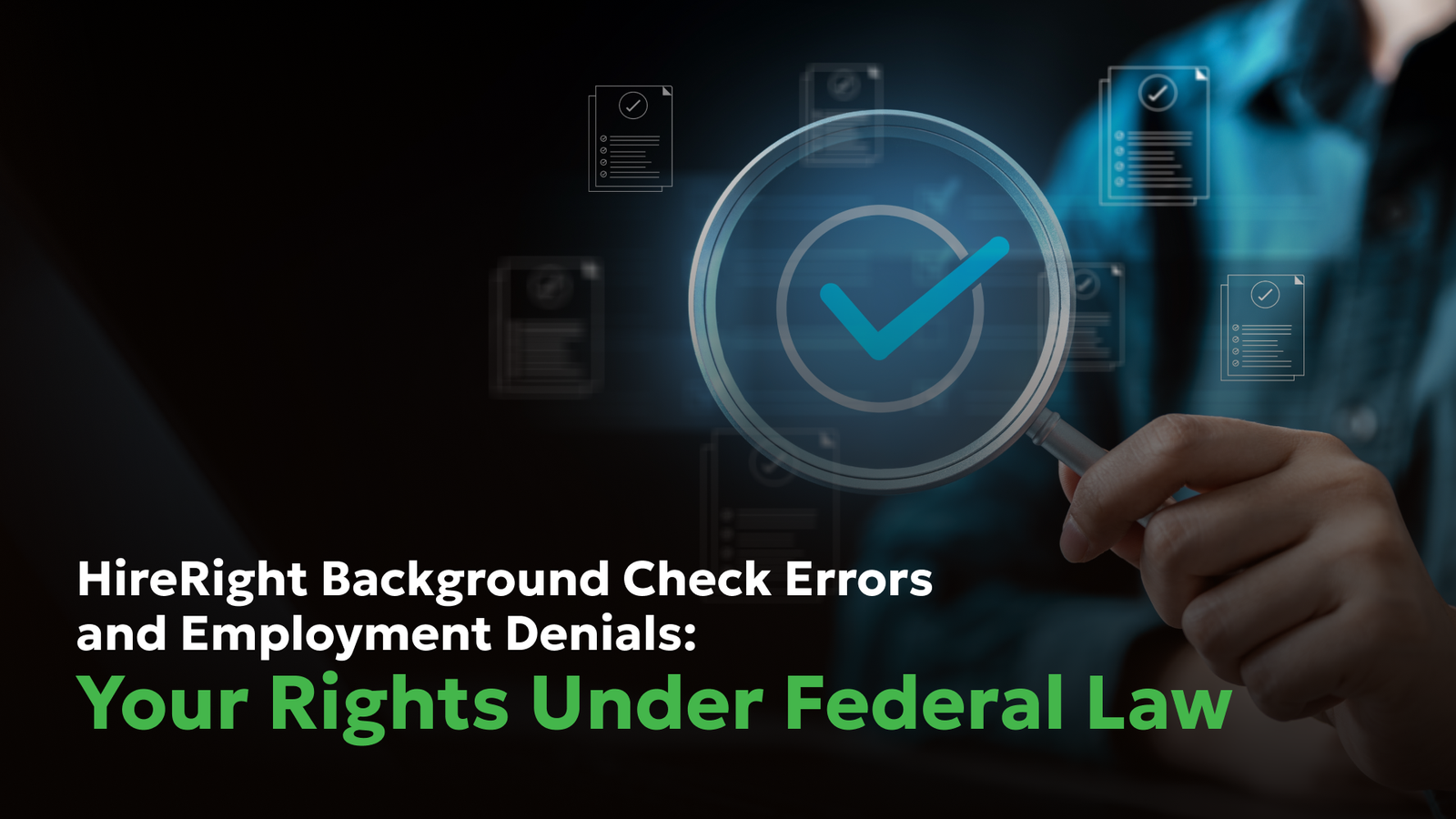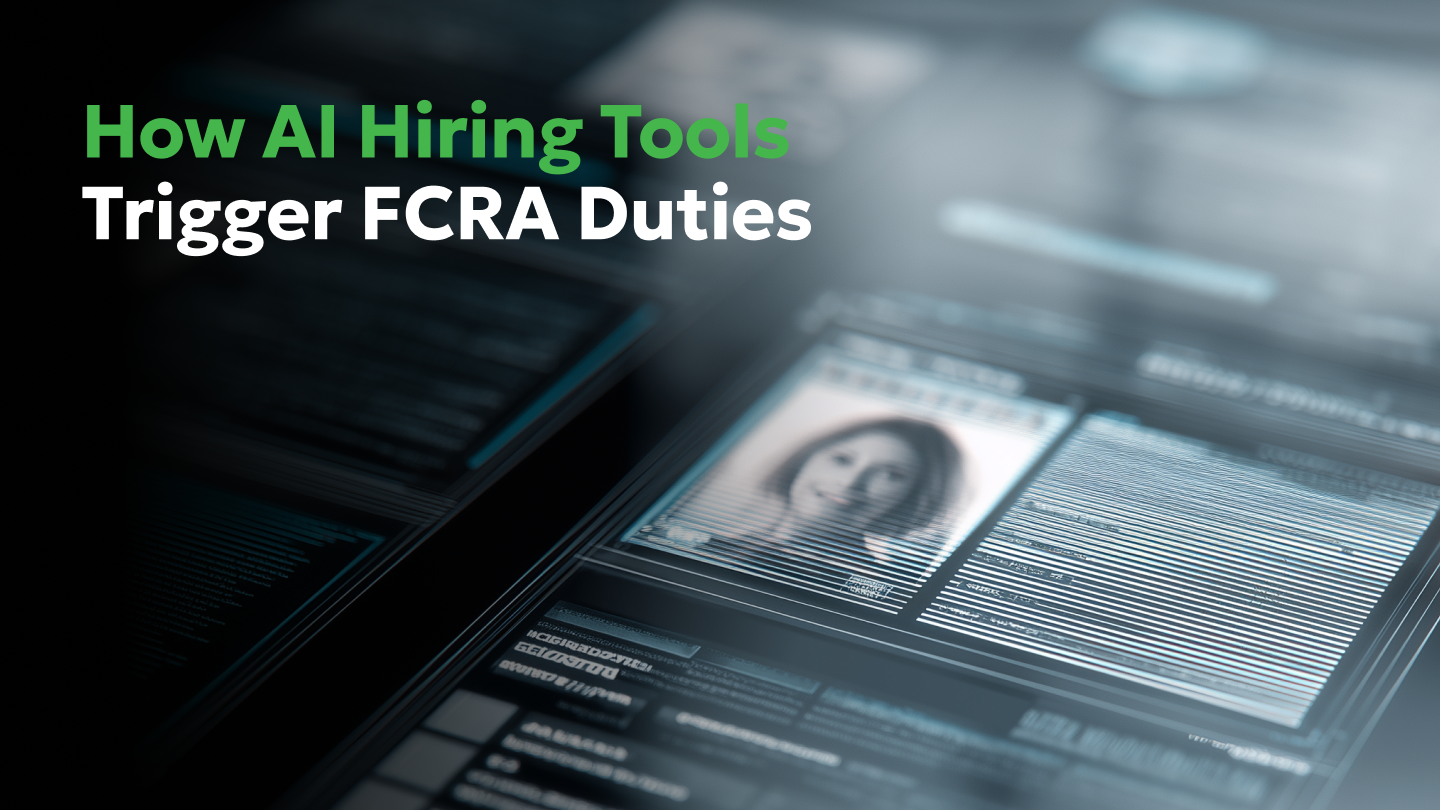Employment Background Checks
- Our Practice Areas
- Background Check Errors
Employment Background Checks

Denied a Job Due to a Background Check Error? Get Compensation with Our Attorney
When applying for a job, most people expect their qualifications - not a flawed background report - to decide their fate. But today, an alarming number of job seekers are being denied employment based on inaccurate, outdated, or misidentified information in their background checks.
Background checks have become standard in hiring. In fact, about 94% of employers now rely on third-party screening companies to run criminal history reports during the application process. These reports are intended to protect employers and promote workplace safety - but when they contain false or misleading data, they can unjustly deny qualified individuals a fair shot at work.
Our background check lawyers help clients who’ve lost job opportunities due to background check errors, especially in three key areas: incorrect reporting, mixed file mistakes, and the improper inclusion of sealed or expunged records.
Case Example - “Made Out to Be Unqualified”
Our client was happily earning income as an Uber driver for several years when a standard background check review was completed. The report, prepared by ********, erroneously stated that his license was disqualified. Though he allowed his commercial license to lapse years earlier because he no longer needed it, his regular driver’s license was valid and in good standing, and is the only license required for ride-share work. This inaccurate reporting led to Uber's deactivation, causing major financial strain.
With Consumer Attorneys on his side, he secured a $110,000 settlement and got his career back on track.
The Problem with Employment Background Checks
Most employers don’t run background checks themselves. Instead, they contract with third-party screening companies - competitors of major players like First Advantage and HireRight - who use massive public and private databases to compile reports. These companies operate at high volume and with minimal human oversight, often relying on automated systems to match records using limited criteria.
Typically, they’ll match records using just your name and date of birth, sometimes without checking other identifiers like Social Security numbers or addresses. When records are pulled from outdated databases or improperly matched, it’s easy for mistakes to occur - and hard for the job applicant to recover.
Common Errors in Employment Background Reports
1. Incorrect or Incomplete Reporting
A major issue in employment background checks is the presence of wrong or misleading information. For example:
- Dismissed or dropped charges may still appear as if they are still active.
- Old arrests that never led to a conviction might be illegally reported past the seven-year limit set by law.
- Charges may be misclassified, such as a minor infraction labeled as a felony.
- Outdated records may still appear, especially if the data hasn’t been refreshed from the source.
Sometimes, a single incident is even listed more than once, exaggerating a person’s criminal history. Employers may quickly reject applicants based on these errors, often without offering an explanation.
2. Mixed Files: When Someone Else’s Record Ends Up on Your Background Check
A “mixed file” happens when another person’s criminal record is attached to your name. These mistakes are especially common when:
- You share a name and birthdate with someone else.
- You are a Jr./Sr., or have a common name.
- You’re an identical twin or have a relative with similar identifiers.
- You’ve lived at the same address or in the same household as someone with a criminal history.
Mixed files can be particularly difficult to correct, especially when the background screening company failed to verify the information properly. Unfortunately, it’s not unusual for someone to find themselves tied to a stranger’s criminal record - and be denied a job because of it.
3. Sealed or Expunged Records Still Showing Up on Your Background Check
One of the most frustrating and legally problematic issues in employment background checks is the reporting of records that have already been sealed or expunged by a court order. These are not pending cases or records that might be sealed “someday” - these are records that the law has already removed from public view, often after a lengthy legal process.
Many individuals spend months or years petitioning courts to have old arrests, dismissed charges, or even certain convictions sealed or expunged. This process may require court appearances, documentation of rehabilitation, and full compliance with eligibility requirements. Once granted, the person should be able to move forward without that record continuing to haunt their employment prospects.
However, background check companies often fail to honor this legal protection. Sealed or expunged records may still appear on reports because:
- The screening company is using outdated or stale databases.
- It never updated the record after the court’s order.
- The data was purchased from a bulk source that never reflected the sealing or expungement.
- The company simply ignored state requirements to refresh or verify data accuracy.
As a result, a job applicant who has done everything the law requires to clear their record may still be denied work due to information that legally should no longer be reported.
This isn’t just a technical error - it’s a violation of both state sealing/expungement laws and the Fair Credit Reporting Act (FCRA), which requires background check companies to use reasonable procedures to ensure maximum possible accuracy.
Clean Slate Laws: A Step Forward, But Not a Cure-All
To address systemic barriers to employment, some states have recently passed Clean Slate laws, which aim to automate the sealing of eligible records - without requiring a petition from the individual. As of July 2024, 42 states and the District of Columbia have enacted laws providing for the expungement, sealing, or set-aside of certain conviction records.
For example:
- Broader Felony & Misdemeanor Relief (17 states + D.C.): Jurisdictions like Arizona, California, and Illinois offer relatively comprehensive mechanisms for sealing or expunging a wide range of felony and misdemeanor convictions.
- Limited Felony & Misdemeanor Relief (21 states): States such as Delaware, Kentucky, and Missouri provide more restricted relief, often with longer waiting periods or exclusions for certain offenses.
- Misdemeanors & Pardoned Felonies (5 states): For example, Georgia and Texas allow for the sealing or expungement of misdemeanor convictions and felonies that have been pardoned.
- Misdemeanor Relief Only (3 states): States like Maine and South Dakota limit record relief primarily to misdemeanor offenses.
- Full implementation is expected by 2027.
Conversely, four states (Alaska, Florida, Montana, and South Carolina), along with the federal system, do not offer general judicial mechanisms for sealing or expunging conviction records. However, they may provide relief for specific categories, such as youthful or first-time offenders.
These laws are promising - but only if background screening companies do their part to stay current and compliant. Unfortunately, even with automated sealing, some companies continue to report outdated or cleared records, undermining the very purpose of these reforms.
Background Check Inaccuracy: A Bigger Problem Than You Think
Even the FBI - widely considered one of the most reliable sources of criminal history data - has struggled with accuracy. Studies have shown that FBI background checks sometimes include arrest records without accompanying information about case outcomes, such as dismissals, acquittals, or expungements. This results in false positives, where individuals are flagged for criminal activity that either never led to a conviction or was legally cleared.
If the FBI can get it wrong, private background check companies are even more prone to error. These companies often purchase bulk data, scrape online court records, and pull from outdated databases - all without verifying context or resolution. The result? Reports that wrongly portray individuals as having criminal histories when, in fact, they may have no record at all - or one that was resolved long ago.
Your Rights Under the Fair Credit Reporting Act (FCRA)
The good news: you are protected by federal law.
Under the Fair Credit Reporting Act (FCRA), background check companies - and the employers who use them - must follow strict rules when using consumer reports to make employment decisions.
Background Check Companies Must:
- Use reasonable procedures to ensure the maximum possible accuracy of the report.
- Correct or delete any inaccurate, outdated, or unverified information.
- Investigate and respond to consumer disputes within 30 days.
Employers Must:
- Obtain your written permission before conducting a background check.
- Provide a pre-adverse action notice - including the background report and a summary of your rights - before making a final decision based on the report.
- Send a final adverse action notice if they choose not to hire you, with information on how to dispute the report.
Legal Remedies If Your Rights Are Violated
If you’ve been denied employment because of a background check error, you may be eligible for:
- Actual damages (such as lost income or emotional distress)
- Statutory damages
- Punitive damages (if the violation was willful)
- Coverage of your legal fees
Whether the mistake is a mixed file, an inaccurate charge, or a sealed/expunged record that never should have shown up, our legal team can help you hold the responsible parties accountable.
Take Action Today
You deserve the chance to compete for a job based on your qualifications - not a background check company’s error.
If you’ve been denied employment due to a background report, don’t wait. Contact our team today for a free consultation. We work on a contingency basis, which means you pay nothing unless we win your case.
These errors shouldn’t decide your future. Contact an experienced Employment background check errors lawyer today! Let’s make it right - together.
Ask for Our Help Now!
Power Up Your Knowledge. Assemble Your Team. Let`s Do This.
Frequently Asked Questions
An employer’s violation of the FCRA’s rigorous framework for the proper use of a background check can be subject the employer to monetary penalties ranging from $100 to $1,000 plus attorneys’ fees for “willful” violations, and actual damages plus attorneys’ fees for “negligent” violations. Additionally, if the employer violated the FCRA with respect to numerous potential employees, a class action lawsuit may be the appropriate enforcement tool to hold the employer accountable. In 2018, Uber settled an FCRA class action lawsuit for $7.5 million for purportedly conducting background checks without giving proper notice and or obtaining the required authorization. In another, similar case, Amazon was forced to settle an FCRA class action lawsuit for $5 million.
Employers are not the only parties whose actions are governed by the FCRA with respect to background checks. If an employer uses a company to compile a consumer report, that company is considered a Credit Reporting Agency (known as a “CRA”) under the FCRA. The FCRA requires that CRAs maintain reasonable procedures to assure the highest level of accuracy of the credit information that they report to employers. Additionally, CRAs are only allowed to provide consumer reports to someone with a “permissible purpose,” such as an employment background check. In the event that a consumer disputes credit information, a CRA is required to conduct a “reinvestigation” into the information reported, which requires the CRA to make a reasonable effort to determine the validity of the reported information. A CRA must also take proper steps to dispose of consumer information by either shredding, burning, or pulverizing the records (or destroying any related electronic information). Likewise, companies and groups that provide information to CRAs (known as “Furnishers”) are also governed by the FCRA with similar requirements as CRAs. Under the FCRA, Furnishers are restricted from sending certain information to CRAs, such as information that would cause a reasonable person to doubt the accuracy of the information or information that a consumer properly reported to a creditor as inaccurate. Additionally, if a Furnisher has reason to believe that information it has sent to a CRA is inaccurate or incomplete, it is required to promptly notify the CRA of the issue and provide the necessary corrections to the CRA. As is the case of an employer, if a CRA or a Furnisher violates the FCRA, it may take the force of a lawsuit to hold them accountable.
If you were recently subject to a wrongful background check by an employer, if you were denied employment based on the results of a background check, or if a CRA or Furnisher wrongly acted in violation of the FCRA with respect to your credit information, contact the attorneys at Consumer Attorneys now to protect your rights. The attorneys at Consumer Attorneys have significant experience litigating under the FCRA on behalf of their clients. Let the attorneys at Consumer Attorneys fight for you!
Related Articles




R
ONGS™You pay nothing. The law makes them pay.
















